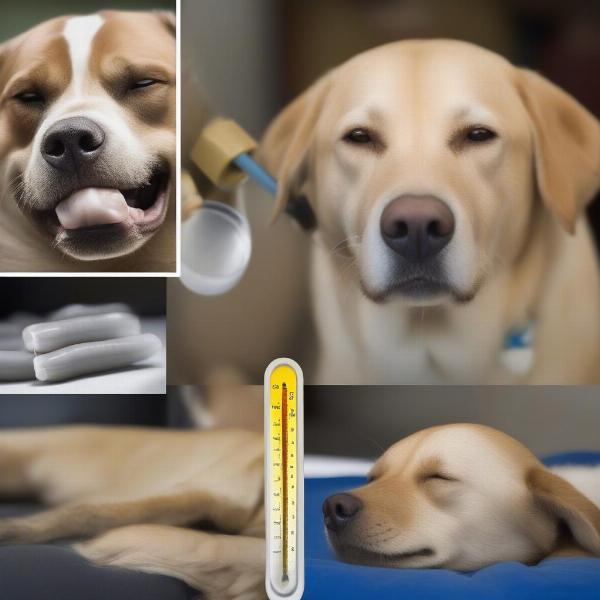Canine hepatitis is a serious viral infection that can affect your furry friend. Understanding how dogs contract this disease is crucial for prevention and early intervention. This article will explore the various ways dogs can get hepatitis, the symptoms to watch out for, and the steps you can take to protect your canine companion.
Understanding Canine Hepatitis
Canine infectious hepatitis, caused by canine adenovirus type 1 (CAV-1), is a highly contagious disease that primarily affects the liver, but can also impact the kidneys, eyes, and lining of blood vessels. While it can affect dogs of any age, puppies and unvaccinated dogs are at the highest risk.
How is Canine Hepatitis Transmitted?
Canine hepatitis is typically spread through direct contact with infected bodily fluids, such as urine, feces, saliva, nasal discharge, and blood. This can occur through:
- Direct contact: Sharing water bowls, toys, or bedding with an infected dog.
- Indirect contact: Exposure to contaminated environments, such as parks, kennels, or veterinary clinics.
- Mother to puppy: An infected mother can transmit the virus to her puppies in utero or through nursing.
- Ingestion: Dogs can become infected by consuming contaminated food or water.
- Airborne transmission: While less common, the virus can also be spread through airborne droplets produced by coughing or sneezing.
What are the Symptoms of Canine Hepatitis?
The severity of canine hepatitis symptoms can vary widely, from mild to severe. Some common signs to watch for include:
- Fever
- Lethargy
- Loss of appetite
- Vomiting
- Diarrhea
- Abdominal pain
- Coughing
- Sneezing
- Eye discharge
- Jaundice (yellowing of the skin and gums)
 Common symptoms of canine hepatitis include fever, lethargy, and jaundice.
Common symptoms of canine hepatitis include fever, lethargy, and jaundice.
How Can I Protect My Dog from Hepatitis?
Vaccination is the most effective way to prevent canine hepatitis. Puppies should receive their first dose of the vaccine around 6-8 weeks of age, followed by booster shots every 3-4 weeks until they are 16 weeks old. dog vaccination schedule chart pdf provides more detailed information. Adult dogs should receive booster vaccinations according to your veterinarian’s recommendations. Other preventative measures include:
- Maintaining good hygiene: Regularly clean your dog’s bedding, food and water bowls, and toys.
- Avoiding contact with infected dogs: Keep your dog away from dogs showing signs of illness.
- Cleaning contaminated areas: If you suspect your dog has been exposed to the virus, thoroughly disinfect any potentially contaminated areas with a pet-safe disinfectant.
What Should I Do if I Suspect My Dog Has Hepatitis?
If your dog exhibits any symptoms of canine hepatitis, contact your veterinarian immediately. 7 way shot for dogs explains the importance of vaccinations. Early diagnosis and treatment are crucial for improving the chances of recovery.
Conclusion
Canine hepatitis is a serious but preventable disease. Understanding how dogs contract this illness, recognizing the symptoms, and taking preventative measures are essential for protecting your furry friend. Vaccination remains the most effective way to safeguard your dog against this potentially life-threatening infection. Don’t hesitate to contact your veterinarian if you have any concerns about your dog’s health. 9 in 1 shot for dogs is another resource for understanding canine vaccinations.
FAQ
- How long does canine hepatitis last? The duration of the illness can vary, but most dogs recover within a few weeks with appropriate treatment.
- Is canine hepatitis contagious to humans? No, canine hepatitis is not contagious to humans. However, the virus can be transmitted between dogs.
- Can a dog recover from canine hepatitis? Yes, many dogs recover from canine hepatitis with proper veterinary care.
- What is the treatment for canine hepatitis? Treatment typically involves supportive care, such as fluids, medications to manage symptoms, and antibiotics to prevent secondary infections. dog parainfluenza virus provides information on another common canine virus.
- Can vaccinated dogs still get hepatitis? While rare, vaccinated dogs can still contract a mild form of the disease.
- Are there long-term effects of canine hepatitis? Some dogs may experience long-term liver damage or chronic eye problems following infection.
- How can I prevent the spread of canine hepatitis in my home? Thorough cleaning and disinfection of contaminated areas are crucial for preventing the spread of the virus.
ILM Dog is your trusted resource for all things dog-related. We provide expert advice on dog breeds, health and wellness, training, nutrition, grooming, and much more. Our passion is helping dog owners provide the best possible care for their beloved companions. Contact us today to learn more about our services and how we can help you and your furry friend. Email: [email protected], Phone: +44 20-3965-8624. Visit ILM Dog for more information.